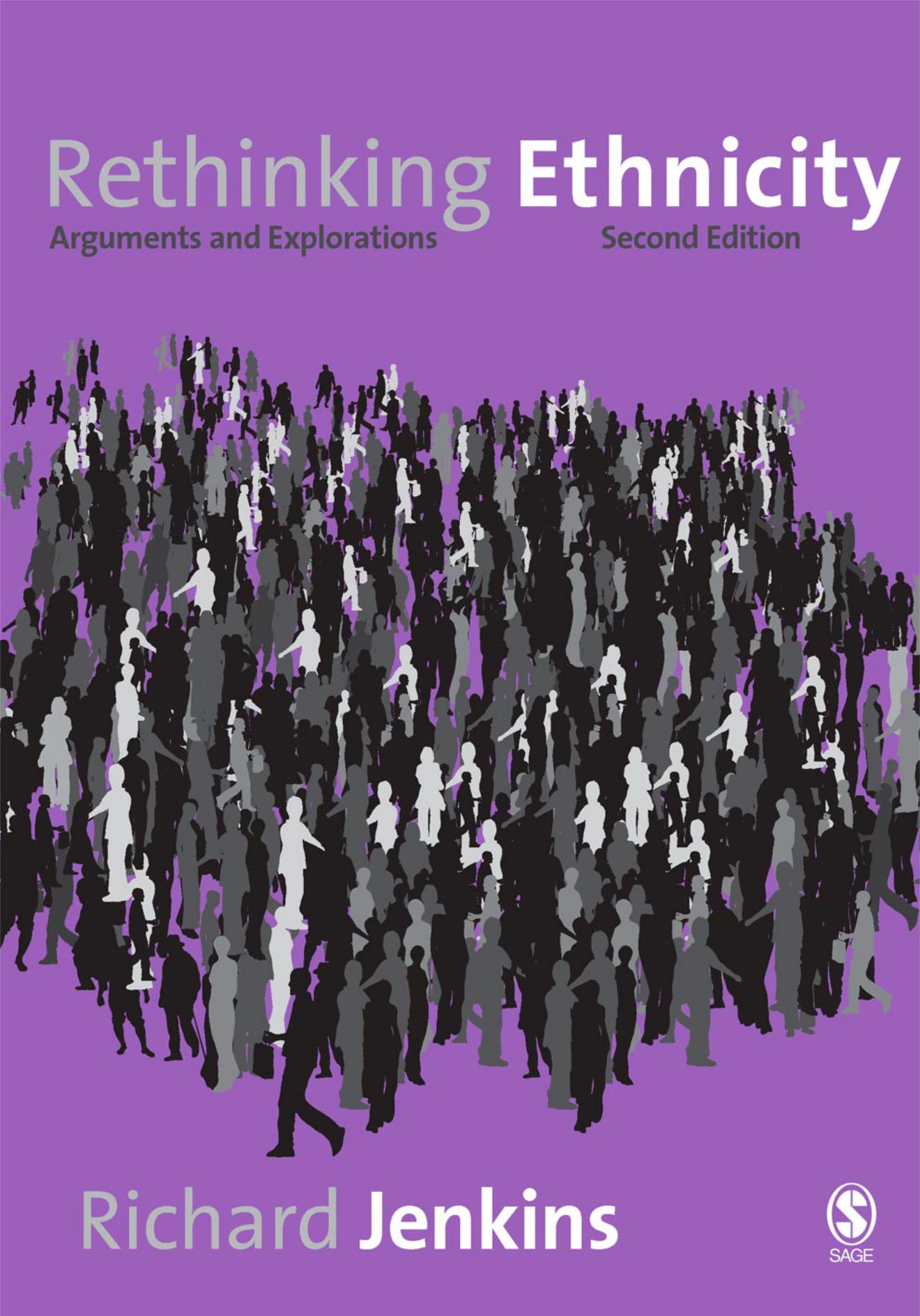
Rethinking ethnicity, 2nd Edition by Richard Jenkins
.pdf

Rethinking Ethnicity


Rethinking Ethnicity
Second Edition
Richard Jenkins

© Richard Jenkins 2008
First edition published 1997
Reprinted 1998, 2001, 2003, 2006
Second edition published 2008
Apart from any fair dealing for the purposes of research or private study, or criticism or review, as permitted under the Copyright, Designs and Patents Act, 1988, this publication may be reproduced, stored or transmitted in any form, or by any means, only with the prior permission in writing of the publishers, or in the case of reprographic reproduction, in accordance with the terms of licences issued by the Copyright Licensing Agency. Enquiries concerning reproduction outside those terms should be sent to the publishers.
SAGE Publications Ltd
1 Oliver’s Yard
55 City Road
London EC1Y 1SP
SAGE Publications Inc.
2455 Teller Road
Thousand Oaks, California 91320
SAGE Publications India Pvt Ltd
B 1/I 1 Mohan Cooperative Industrial Area
Mathura Road
New Delhi 110 044
SAGE Publications Asia-Pacific Pte Ltd
33 Pekin Street #02-01
Far East Square
Singapore 048763
Library of Congress Control Number: 2007929115
British Library Cataloguing in Publication data
A catalogue record for this book is available from the British Library
ISBN 978-1-4129-3582-1
ISBN 978-1-4129-3583-8 (pbk)
Typeset by C&M Digital Pvt Ltd, Chennai, India
Printed in Great Britain by The Cromwell Press Ltd, Trowbridge, Wiltshire Printed on paper from sustainable resources

Contents
Introduction to the Second Edition |
vii |
|
Arguments |
1 |
|
1 |
Anthropology and Ethnicity |
3 |
2 |
From Tribes to Ethnic Groups |
17 |
3 |
Myths of Pluralism |
28 |
4 |
Ethnicity Etcetera |
42 |
5 |
Categorization and Power |
54 |
6 |
Ideologies of Identification |
77 |
Explorations |
91 |
|
7 |
Majority Ethnicity |
93 |
8 |
The ‘Cultural Stuff’ |
111 |
9 |
Violence, Language and Politics |
128 |
10 |
Nations and Nationalisms |
147 |
Rethinking Ethnicity |
169 |
|
Notes |
175 |
|
Sources and Acknowledgements |
178 |
|
Bibliography |
180 |
|
Index |
203 |
|


Introduction to the Second Edition
A second edition of any book that has ‘Rethinking’ in its title is vulnerable to two potentially disconcerting responses. The first of these is the expectation that it will offer a re-rethinking of the first rethinking: something strikingly new and original by comparison with its first argument, perhaps, or even a public confession of error. The second is the suggestion that no one took much notice the first time around.
With respect to the first of these, I cannot claim to have changed in any significant way the arguments or proposals put forward in the first edition. There has been a little minor fine-tuning, and a little polishing, but nothing that modifies the central thrust of what I had to say. I hope that this reflects the basic defensibility of my position, rather than intellectual sclerosis. All of the chapters have been comprehensively updated, to situate my arguments with respect to significant additions to the literature over the last ten years or so, and to take account of the changes that have taken place in Northern Ireland, Wales and Denmark, my case studies. A couple of minor factual errors have been dealt with, and some clumsy writing has, I hope, been improved. But the rethinking that I am doing in the second edition is the rethinking that I was doing in the first. I still think that much anthropology, for example, could pay more attention to power and its exercise than it does. I also still think that what I call ‘the basic anthropological model of ethnicity’ offers the best starting point if we want to understand better how ethnicity works.
With respect to the second point, it is more difficult to offer a convincing response. That the book sold well enough to indicate a second edition, and continued to do so even after eight or nine years, might be taken to mean that someone has been paying attention. However, at least one of the book’s original theoretical centrepieces – concerning the routine significance of external definition and categorization – has yet to take the social sciences by storm. If for no other reason, this is sufficient reason to offer a second edition.
On the other hand, much of the rest of what I said in 1997 met more than halfway the arguments of a range of fellow travellers whose works appeared at about the same time, or have appeared since. In particular – and you can look them up in the bibliography – I would like to spotlight Rogers Brubaker, Craig Calhoun, Stephen Cornell, and Joe Ruane and Jennifer Todd. Their work, and in some cases their friendship, is an ongoing inspiration, in many different ways. Although we disagree about many things, we have, it seems to me, converged on the shared central ground of a critical sociological constructionism that is keen to understand why identification matters to people, or not (because it doesn’t always). This inspires the hopeful belief that we are basically heading in the right direction. My acknowledgements and thanks go out to them all.

viii Rethinking Ethnicity
Other acknowledgements are necessary, too. Since 1995, the staff and students of the Department of Sociological Studies at the University of Sheffield have made it a congenial place in which to research, teach and write. More widely, my anthropological friends in Denmark – in Aarhus and Copenhagen – and my social science friends in Northern Ireland – at Queen’s and Ulster – continue to keep me on my toes. ‘Critical friends’ they are, too, which is just as it should be. At the risk of overlooking someone, others who have made the world intellectually more stimulating over the last ten or so years include Thomas Hylland Eriksen, Michèle Lamont, Sinisˇa Malesˇevic´, Andy Thompson, and the staff and students in the Novosibirsk group. Rosemary Campbell has been an exemplary editor. Finally, the usual completely inadequate gratitude has to be offered to Jenny Owen.
Richard Jenkins
Sheffield
2 September 2007

Arguments
I have been working on matters to do with social identity in general, and ethnic identity in particular, for nearly thirty years. As a social anthropology student, a post-doctoral researcher, and subsequently as a university teacher in sociology and anthropology, I have always been keenly aware of the intellectual and political importance of these topics, and the difficulties which one faces in trying to research and teach about them adequately, openly, and even-handedly.
The questions and issues that I have encountered during this time are not, however, important only in my professional, academic life. These attempts to understand better social identity – and more specifically ethnicity – are part of an ongoing dialogue with my own history and biography, and are the product of personal experience. Coming from a family that, according to the researches of my amateur genealogist sister, mixes English, Welsh and Irish ‘blood’, I was born in Liverpool, moving as an infant to a middle-class suburb of Rotherham, in Yorkshire. From there, at the age of eight, I was brusquely transported to a respectable working-class housing estate on the hilly fringes of Larne, a small Northern Irish town. Identified by my peers as English, in the years between eight and twenty-five I had to learn to understand, if not actually fully participate in, the ethnic subtlety and bluntness of Northern Ireland. On the one hand, to negotiate the boundary between English and Northern Irish; on the other to negotiate the distinction between Protestant and Catholic. While it has been very many years since I have been able to see myself as English, I am not, in any straightforward sense, Irish either. And being Protestant in Larne was a very different thing than it had been in Rotherham.
But Larne eventually became – and remains – home. Northern Ireland is certainly where I feel most ‘at home’. My children were born there: half me, half their DutchIndonesian mother. In the peregrinations that followed, they eventually came to call Swansea, in South Wales, home (and I have come to support the Welsh rugby team). In the court of final demands, they continue to call themselves Irish, by dint of place of birth and sentiment, but they do ‘being Welsh’ in many important everyday respects. And as their home, and as the home of some of my dearest friends, Swansea has become in large part home to me also. To add to the personal tale, I now live within ten miles of my childhood Yorkshire home; but I have definitely not ‘come home’. I could add in further complexities – not least with respect to my relationship to a small town in Denmark, where I have spent a great deal of time over the last ten years – but these are perhaps sufficient to show why I am interested in identity, and ethnicity in particular.
There is another kind of genealogy too, which emphasizes two particular moments, one longer-term engagement, and a consistent thread of indebtedness. The first occasion was in the early 1980s. The SSRC Research Unit on Ethnic Relations in Birmingham, where I was a researcher at the time, was running a taught Master’s
